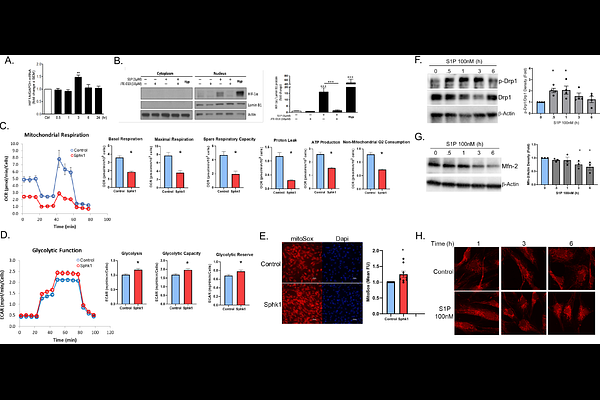The mitochondrial unfolded protein response and metabolic reprogramming promote PASMC proliferation in response to sphingosine kinase-1/sphingosine-1-phosphate signaling

The mitochondrial unfolded protein response and metabolic reprogramming promote PASMC proliferation in response to sphingosine kinase-1/sphingosine-1-phosphate signaling
Lockett, A. D.; Snow, A.; Adogamhe, P.; Sysol, J.; Yadav, M.; Mubuuke, T.; Gomes, M. T.; Cook, T.; Fisher, A.; Aldred, M.; Machado, R. F.
AbstractProliferation and vasoconstriction of the intimal smooth muscle layer of the pulmonary artery are pathogenic characteristics of pulmonary arterial hypertension (PAH). Altered mitochondrial function, i.e. glycolysis, ROS generation and fission, are known potentiators of vascular remodeling. However, most current therapeutic interventions fail to effectively address the proliferation of the pulmonary artery smooth muscle cells (PASMCSs) lining the pulmonary vasculature and highlight the importance of identifying novel pathways to target for intervention. The Sphk1/S1P/S1P2 signaling axis is upregulated in PAH patients and is known to induce PASMC proliferation during hypoxia-mediated pulmonary hypertension (HPH). Interestingly, Sphk1 modulates mitochondrial function in that it regulates dynamics, cell growth and survival and in C. elegans, it induces activation of the unfolded protein response (UPRmt). We aimed to investigate if the Sphk1/S1P/S1P2 signaling axis promotes vascular remodeling in PAH via activation of the UPRmt. PASMCs isolated from IPAH patients were subjected to RNAseq analysis. The effect of Sphk1 or S1P was interrogated in hPASMC cell lines and the HPH model was used to assess the effect of the UPRmt on PAH pathogenesis. RNAseq analysis revealed that pathways involved in mitochondrial respiration were among the top 20 most significantly regulated pathways. Furthermore, ATF-5, the transcription factor that mediates the UPRmt was significantly upregulated. In hPASMCs, Sphk1/S1P lead to decreased respiration, increased glycolysis, fission, ROS and UPRmt activation. Pharmacological inhibition of the UPRmt mediator, mtHSP70, mitigated the Sphk1 induced increase in hPASMC proliferation. Furthermore, mtHSP70 inhibition was protective in hypoxia-mediated pulmonary hypertension (HPH) as we observed a decrease in right ventricular systolic pressure, right ventricular hypertrophy and vascular remodeling. These data suggest that the UPRmt promotes vascular remodeling in PAH and may present a novel pathway to target for pharmaceutical intervention.